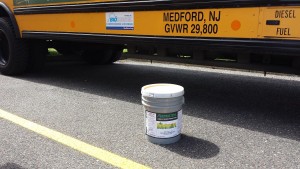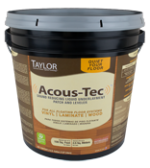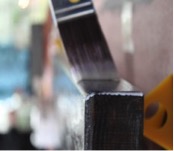BioStripe Parking Lot Paint Helps Medford School District Go Green
Soy-biobased parking lot paint is one biobased product helping New Jersey’s Medford Township Public School system shrink its environmental footprint.
“Our path toward increasing sustainability took another turn this spring when we applied BioStripe® traffic paint in two of our parking lots,” said Joe Biluck, Medford’s director of operations and technology. “Each time we substitute a soy-biobased product for a petroleum-based product, we lessen our environmental impact for the benefit of our school children and our staff.”
Biluck reports that the contractor who applied the BioStripe paint found that it flowed the same, covered the same, and dried in the same amount of time as conventional striping paint. The contractor said he liked the product as soon as he opened the pail because the vapors did not burn his nose.
A USDA Certified Biobased Product, BioStripe is the first waterborne traffic paint made with soybean oil, a rapidly renewable ingredient, which reduces its petroleum content. It is low VOC, and available in standard zone marking colors.
Biluck explained that switching to a biobased alternative is not a decision he takes lightly. “It requires careful consideration. We won’t make a switch unless the products meet two important criteria: they must get the job done as well — or better — than the product they’re replacing, and they must be cost-competitive.”
For the last 17 years, schools across the nation have learned from the Medford model for sustainability. In 1997, Medford was the first school district in the country to use biodiesel, which is made from diverse agricultural oils, including soybean oil. Medford’s total use of biodiesel has eliminated over 123,376 pounds of smog-forming emissions and 2,408 pounds of diesel particulate matter.
Looking to build on success with biodiesel and the other sustainability initiatives, Medford also turned to biobased products, many of which use soybean oil as an ingredient to replace petroleum and harsh chemicals.
In addition to the traffic paint, Medford now uses biobased spray lubricants, drain and septic treatment, mold and mildew remover, carpet shampoo, white board restorer, all-purpose cleaner, motor oil, and truck/bus wash as well as biodiesel and the soy-backed carpet.
“Incorporating our sustainability initiatives into the classroom is the logical next step. Exposing our students to these processes enriches th eir leaning experience.” Biluck added.
eir leaning experience.” Biluck added.
To learn more about BioStripe parking lot paint, visit http://www.aexcelcorp.com.



